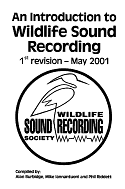Conclusion

I hope that this newcomer's guide to wildlife sound recording has helped you with your selection of what you need to record bird song. It is necessarily limited to one perspective, the birdwatcher recording from a distance. Listen to some recordings made using this type of equipment to get an idea of what results you can expect. There is much more to wildlife than birds - and there a more ways to record birds than described. I have attempted to set you on the right path to getting some satisfying recordings of birds. If you want to know more detail, the Wildlife Sound Recording Society publishes a 26 page booklet titled An Introduction to Wildlife Sound Recording. This goes into much more detail, including the challenges of stereo, and how to approach recording birds using remote microphones close to the birds without the recordist causing disturbance to the species, and the pros and cons of various microphone types and pickup patterns for natural sound recording.
Once you have your equipment, your running costs are low, and the way to becoming better is to get out and record, and listen to what you record and ask yourself how you can do this better. Sound is evocative, and some of your recordings will remind you of special moments in the field, even if they are not technically perfect. Treasure these moments too - never has sound storage been so cheap.
Take a look at the benefits of joining the WSRS - they distribute a regular Sound Magazine on CD which features members' recordings from around the world. Hearing other people's work gives you perspective. The Society also publishes a Journal which describes recordings, locations and species studies of vocalisations, to help understand the world of animal sounds a little better. Should you be looking to improve the quality of your recording setup or extend it to other areas, you will find the reviews helpful, and may find other members selling off suitable gear to extend your capabilities.
I wish you a lot of enjoyment from recording the sounds of nature, and perhaps you will share some of your recordings with fellow WSRS members on future issues of the WSRS Sound Magazine.